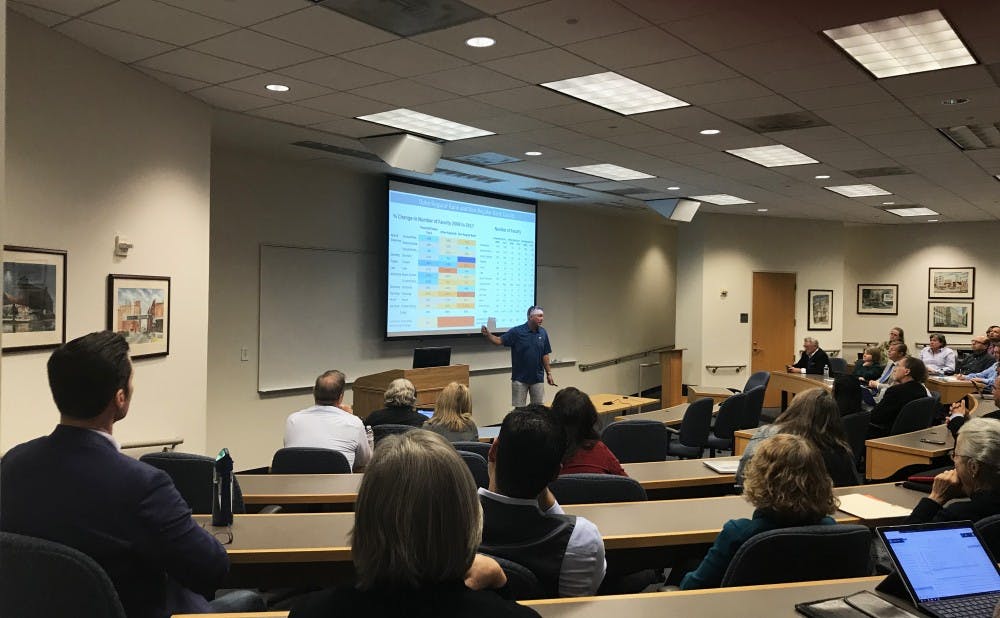After tightening the rules on romantic and sexual relationships between faculty and students last Spring, Academic Council is doubling down on its quest to make a cultural change among faculty regarding harassment.
Chairman Don Taylor, professor in the Sanford School of public policy, opened Thursday's discussion of faculty's role in adjudicating cases of harassment as the first step in a broader look at the issue the council will take this year.
He explained the five ways that faculty are currently involved in conduct processes across the University to lay the groundwork for ongoing discussion about possible changes to those processes and faculty's role in them.
Here are five key takeaways from the council's discussion about conduct processes.
There are more than a dozen sexual misconduct cases that make their way through the conduct process. Larry Moneta, vice president for student affairs, told the council that the sexual misconduct process hears about 15 to 16 sexual misconduct cases per year, but that hundreds of claims are taken to the Women's Center. Faculty sit on the three-person panels, and the training to be qualified to do so takes eight hours.
Having faculty involved in the processes makes things move more smoothly, Moneta said.
"Partnering with faculty in policy development and enforcement ensures a more favorable outcome," Moneta said.
The goal is to change the faculty culture around harassment. Taylor said that "faculty are disproportionate producers of the harm" against staff and sometimes students. But because so much of the issue falls below the legal level of harassment—such as a professor making their graduate student walk their dog—the change will have to be cultural one.
“[It is] an attempt to stimulate and grow a culture change in the faculty," Taylor said.
Faculty are involved in adjudicating claims of harm in five ways. Two faculty or staff members sit on the Undergraduate Conduct Board, which is a Student Affairs committee that sees all undergraduate issues. Duke's other schools also have conduct processes, in which the faculty are involved.
The University Judicial Board is a presidential committee that assists incases across communities. Additionally, the Harassment Grievance Board is also a presidential committee that includes 12 faculty members. The Faculty Hearing Committee is an Academic Council committee that has 16 faculty members on it.
It's hard to get tenured faculty to serve on the Undergraduate Conduct Board. Taylor showed a slide that contained the composition of faculty who sit on the UCB. There have been three professors of the practice, five associate professors of the practice, one professor of the practice emeritus, one research professor, one associate clinical professor, three academic deans and one assistant vice provost. Taylor said that Moneta has been actively recruiting tenured faculty to serve on the board.
The discussion is ongoing. At the council's Nov. 15 meeting, Taylor said that there will be a discussion between Ann Brown, vice dean for faculty in the School of Medicine, and Valerie Ashby, dean of the Trinity School of Arts and Sciences, about harassment.
“[The Executive Committee of Academic Council] just feels like this is time to do it and we have the power to do it,” Taylor said.
In other business
The council heard a report from Gavan Fitzsimons, Edward and Rose Donnell Professor in in the Fuqua School of Business and chair of the ad-hoc committee on faculty rank distribution, about changes to the faculty rank distribution during the last decade.
Members also voted unanimously to approve changes by the nursing school to its tenure, appointments and promotions process.
Get The Chronicle straight to your inbox
Signup for our weekly newsletter. Cancel at any time.
Bre is a senior political science major from South Carolina, and she is the current video editor, special projects editor and recruitment chair for The Chronicle. She is also an associate photography editor and an investigations editor. Previously, she was the editor-in-chief and local and national news department head.
Twitter: @brebradham
Email: breanna.bradham@duke.edu

